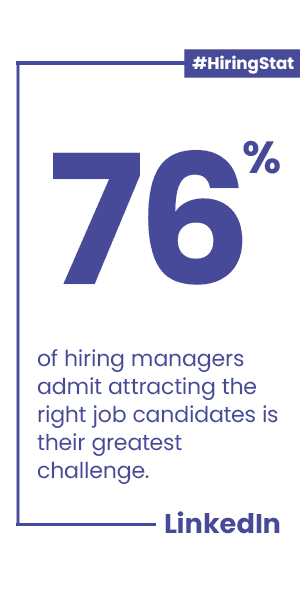The hiring manager is a critical player in the hunt for new talent. They will have full responsibility for the performance, engagement, and retention of their new report, so why do many brands find working with them an adversarial relationship? Primarily, the lack of communication and clear, defined objectives of what the new hire should bring as a value to the organization and what information will be used to help reveal it. Ultimately, the hiring decision rests with the hiring manager, so enabling them with the needed technology-enabled tools, sets them up for success.
This question is a big part of the problem. Until everyone involved in the hiring process realizes all people are key players, there will be an “us vs. them” attitude. Ensuring the hiring manager has  access to necessary tools and information creates a consistently efficient process. Technology-enabled communication tools can create an atmosphere for valuable exchanges of dialogue and information that promote proactivity between recruiters and hiring managers, aligning both for greater efficiency.
access to necessary tools and information creates a consistently efficient process. Technology-enabled communication tools can create an atmosphere for valuable exchanges of dialogue and information that promote proactivity between recruiters and hiring managers, aligning both for greater efficiency.
Being prepared ensures that both the hiring manager and candidate have a good experience during the hiring process. This is where good and timely listening skills come into play. Listen to the hiring manager, and step up to get the needed information to begin a strategy. It’s a waste of everyone’s time if the information the hiring manager needs is provided after candidates are presented, or, worse — after candidates have been interviewed. Fine-tuning the strategy on the front end is a sound recruiting practice. Some of the basic questions recruiters should ask the hiring manager upfront are:
Ensuring the hiring manager has access to necessary tools and information creates a consistently efficient process.
For the recruiter, being the subject-matter expert on the practice of recruiting enables the fundamentals to support his/her success to kick into action. Keep in mind, the hiring manager is an expert in his/her field of work and understands the team’s culture, as well. A good hiring manager will rely on the knowledgeable advice of the recruiter to help steer the process and keep it running efficiently. Have a plan-of-action in place and make recommendations so you both know how the course of events will progress, and develop a flexible mindset to revisit the plan-of-action. This can, often times, help keep everything moving forward and help everyone involved to weather hiccups that may occur.
Not all positions are easy to fill; knowing this up front helps the recruiter plan a solid strategy and reduce stress for everyone. If you’re an inexperienced recruiter, be sure to share your strategy with the hiring manager. They may have prior knowledge with filling the position and can share what has and hasn’t worked in the past. Incorporating keen listening skills and being flexible to accept this advice can create better efficiencies. Consider all courses of action and any direction provided by the hiring manager, then evaluate which are best.
Keep in mind, not all positions can be sourced using the same strategy. Some positions will be high touch and others a matter of using your pipeline to generate leads. Of course the more inclusive the strategy, the better chance recruiters have for sourcing and recruiting highly qualified candidates. Use technology to help with communications and networking, but remember technology is there to streamline the process and not to eliminate the need for human intervention. Listening well and utilizing technology-enabled communications are basics needed by the talented recruiter.
Hiring is a team effort which requires exemplary communications between all the stakeholders involved. It really does take a village to hire. This is why SmartSearch has developed the Hiring Manager Portal. Using this tool, hiring managers can actively communicate with recruiters to create a better hiring process for managers, recruiters, and candidates. To learn more about the SmartSearch hiring manager portal, CLICK HERE.